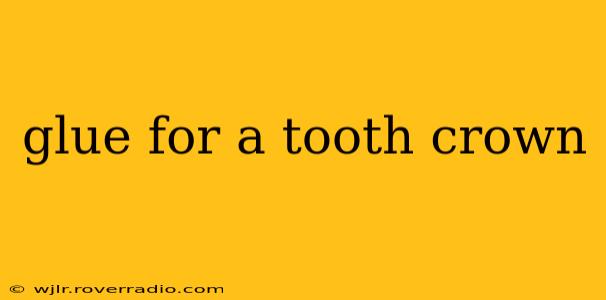Losing a crown is a frustrating experience, leaving you with sensitivity, discomfort, and the urgent need for a solution. While many might initially think of household glues, it's crucial to understand that using anything other than dental cement for a temporary or permanent crown fix is extremely dangerous and ineffective. This article will explore the types of dental cement used for crowns and address common questions surrounding this sensitive topic.
What kind of glue is used for a tooth crown?
Dental professionals use specialized cements designed for the unique demands of the oral environment. These cements aren't "glues" in the traditional sense; they are biocompatible materials that bond securely to both the tooth and the crown, creating a strong, long-lasting seal. Several types of dental cement exist, each with specific properties:
-
Zinc phosphate cement: A long-standing option, known for its strength and relatively low cost. However, it can be irritating to the tooth's pulp (the inner nerve) and requires careful mixing to avoid exothermic reactions (heat generation).
-
Glass ionomer cement: This cement releases fluoride, which helps protect the tooth from decay. It's less irritating than zinc phosphate but may not be as strong. It's often used for temporary crown cementation.
-
Resin-modified glass ionomer cement: This combines the fluoride release of glass ionomer with the strength of resin cements, offering a good balance of properties.
-
Composite resin cement: Strong and aesthetically pleasing, offering excellent bonding capabilities. It's often chosen for its ability to match the tooth's color.
-
Self-adhesive resin cement: Requires less preparation and is easier to use, making it suitable for both temporary and permanent cementation in certain situations.
Can I use super glue to reattach a crown?
Absolutely not. Super glue, or cyanoacrylate adhesive, is not designed for use in the mouth. It's not biocompatible and can be toxic, potentially causing severe irritation, allergic reactions, or other health problems. Furthermore, it lacks the necessary strength and bonding properties to securely attach a crown, leading to potential displacement and further damage. Always seek professional dental care to reattach a crown.
What happens if I swallow dental cement?
While dental cements are generally considered biocompatible, accidentally swallowing a small amount is unlikely to cause serious harm. However, large amounts could potentially cause gastrointestinal upset. If you suspect you've swallowed a significant quantity of dental cement, consult a doctor or poison control center immediately.
How long does dental cement last?
The longevity of dental cement depends on several factors, including the type of cement used, the patient's oral hygiene practices, and the overall condition of the tooth and crown. Permanent cementation is expected to last for several years, but regular dental checkups are crucial to monitor the bond and address any potential issues early on.
How much does it cost to have a crown reattached?
The cost of reattaching a crown varies depending on several factors including location, dentist's fees, and the type of cement used. It’s best to contact your dentist directly for an accurate estimate. However, it's significantly less expensive than getting a completely new crown.
Conclusion: Prioritize Professional Care
When dealing with a lost or loose crown, always prioritize a visit to your dentist. They possess the expertise, materials, and equipment necessary to securely reattach the crown using appropriate dental cement, ensuring the best possible outcome for your oral health. Attempting to repair a crown at home with household adhesives can lead to severe complications and unnecessary costs in the long run. Remember, your oral health is paramount!
